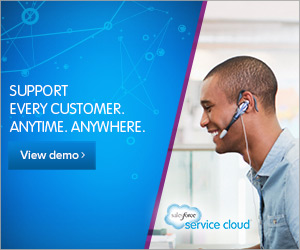
License: Creative Commons image source
As technology evolves, and the general population becomes more competent in their use of computers, businesses are increasingly implementing self-service solutions with a view to increasing efficiency and cutting costs. In line with this trend, some HR software providers, such as Cezanne HR, have begun offering self-service modules, designed to allow employees to assist with common human resources tasks.
Could your business benefit from allowing employees more control over your human resources processes?
Pros
For advocates of self-service HR, there are several good reasons for using the technology. Here are the most commonly reported benefits.
Reduces HR workload
For the HR team, self-service software can provide major time and cost savings. Employees can enter their own holiday requests directly into the system, for instance, reducing the workload of line managers and the HR team alike, who would otherwise have to re-key the requests themselves. Virtually any common HR admin task can be similarly enabled via self-service.
Employees can also update their existing information, such as new bank account details or address changes, themselves. In this way employees can check their own data is correct, giving them peace of mind, and reducing the volume of queries and complaints to the HR department.
Empowers employees
By allowing staff some degree of control over their own HR data, you also empower them to take more control of their own careers. As well as being able to enter and update their information, your HR system can be configured to accept other input.
Employees can register for training courses directly, or log requests for new certification and accreditation. These can then be processed and approved directly from the HR system, the relevant purchase order details passed on to accounts, and confirmation emailed to both employee and line manager.
By empowering employees in this way, they are able to take more control of their career, helping to raise morale in the process.
Keeps HR records up to date
Because the employee becomes responsible for maintaining their own data, they also shoulder the responsibility for errors. However, personal details are more likely to be correct simply because it is only keyed once. Where data is passed from employee to line manager to HR, the chances of mistakes being made during re-keying are greatly reduced. And fewer errors means less reparative work by HR when problems come to light.
Your team will still need to routinely check that data is compliant with employment law, but the time and effort involved will be significantly lower than if the responsibility remains with HR.
Inform company policy
Many employers use self-service HR to encourage feedback from their staff. Requesting information regarding perceived skills shortages is a good way to plan future training courses, for instance. Self-service data is also a good way to gauge employee morale, so that remedial action can be taken when problems are identified.
Over time, the HR department will also begin to note trends in the feedback received from employees. These could be specific skills gaps, or times of year when staffing levels drop to levels at which productivity is impaired.
These observations can be used to inform future policy, or to adapt existing working practices for greater efficiency.
Go green!
For businesses intent on becoming more socially responsible, a reduction in physical paper usage provides another compelling argument for adopting self-service HR systems. Instead of completing holiday request forms on paper, the same information can be submitted online, directly into the HR system.
As requests are processed and approved (or denied), the employee and their line manager are informed of the decision by email. The employee can also check their HR data themselves online; there is no longer any need to use paper at any point of common HR processes.
And the added bonus is that apart from being greener, electronic forms are also less likely to be lost.
Open up the recruitment process
Self-service HR systems can also be opened up to people outside your company to help streamline the pre-interview recruitment process. By linking from your website, candidates can complete job application forms or upload their CV, automatically entering contact data (and more) directly into your HR system.
As with the internal processes, enabling data collection in this way ensures data is more likely to be correct, reduces the administrative burden of recruitment, and cuts down on paper and postage costs.
Cons
Although self-service HR offers significant benefits, there can be a few drawbacks that need to be considered before deploying such a system in your business.
May take longer to set up
Deploying an HR system takes time; time to perform the initial install, to import data and to manage the transition. Adding a self-service module may add some additional time to the initial roll-out depending on the technologies used, and whether it is to be used externally too.
Every deployment is different, but your HR software vendor will be able to provide a proper time estimate before your project starts.
May involve more training initially
Self-service systems are relatively intuitive, but staff will probably still require some basic training to understand how you expect them to use it. As such, deployment of self-service may be more expensive because of the increased training costs.
Data security issues
Human resources data is particularly sensitive, and must be protected from unauthorised access. Wherever employees are given access to restricted systems, there always remains the potential for abuse.
A good HR software platform will have proper security provisions in place to prevent employees from accessing data belonging to their colleagues. However, where staff share login details, there always remains a slim chance that malicious employees will use this knowledge to access data illegally.
In reality, the benefits of giving employees more control over HR using self-service data far outweigh the negatives. However, it is good practice to fully consider each in the context of your own business and specific operational needs.
About the Author: Written by Michael Palmer, an Oxford-based business graduate who blogs about human resources management.













